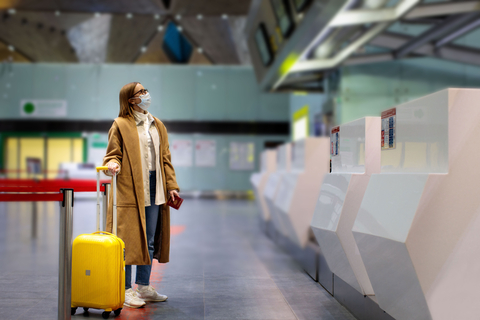
Plans for before, during and after
Our summary of some COVID-19 related travel advice for those who are planning trips - detailed information can be found in our coverage of COVID-19 Coronavirus and Travel.
We suggest visiting quieter locations rather than tourist hotspots where social distancing and avoiding crowds can be harder to manage. This would also offer some assistance to those smaller communities and local businesses which have been severely impacted by lockdown restrictions.
But before you venture out there are a couple of considerations, like ensuring your routine vaccinations are current. If you have completed the childhood immunisation series, then that might just mean the annual flu shot, or for those aged over 70, pneumococcal and shingles vaccines. Consult your doctor if you have any medical conditions as this may change the vaccine recommendations.
Put together a first aid kit with antiseptic, bandages (including a pressure bandage – see Snakes section), dressings, blister pack, antihistamines, medication for managing gastro symptoms (oral rehydration solution, ‘stopper’ drug) and fever/ respiratory tract infections and topical steroid cream. Oh, and don’t forget the sunscreen and insect repellent (see Insects/Arachnids section).
By car, or flying?
Travelling by private car with other members of your household is obviously the safest way to travel, but if you are flying to your destination there are a few pointers to remember. This is because the risk of virus spread on an aircraft is generally similar to any other confined space, although it is probably slightly better due to effective air filtration systems operating in modern planes.
- First and foremost, don’t travel if you’re sick or have any symptoms. Contact (don’t visit) your doctor for advice on the next steps.
- Practice good hand hygiene, using soap and water or alcohol-based sanitiser.
- Maintain social distancing - although this may be impossible on board.
- Cough or sneeze into your elbow, or a tissue (which should be safely disposed of and wash hands or sanitise promptly).
- The airline may request that all passengers wear masks (N95 masks are recommended) and we think that this is advisable even if it isn’t mandatory.
- Regularly disinfect surfaces around your seat, including the tray table and armrests using anti-viral wipes or hand sanitiser.
You’ve arrived!
When it comes to staying in hotels or other types of accommodation, it would be wise to find out during booking if the venue has measures in place to reduce the spread of COVID-19 – they may provide more cleaning or have no contact options for check in, or even room service.
The following is a summary of questions and answers relating to travel and COVID-19 published by the World Health Organization (WHO)1:
- What precautions should everyone take in a hotel or other accommodation establishment?
Follow basic precautions – hand sanitising, cough etiquette, social distancing with the use of a mask if not possible (or if mandated locally).
- Are pools and water areas safe to use?
Physical distancing assured, mask policy in place, hand hygiene, careful rubbish disposal, single-use high touch areas such as door handles disinfected regularly throughout the day
- Are there precautions to take while eating in a restaurant?
Buffets not advisable, again physical distancing with adherence of patrons per square metre rule, mask use for close contact (staff and guests), hand sanitising on arrival and departure
- Is it safe to use fans or air conditioning in an accommodation?
Recirculated air to be avoided, open windows if possible, use of fans not recommended if sharing space with guests outside your household
- Can you get the virus from people who were in the room previous to you?
Ensure the establishment has the correct processes for cleaning, disinfecting and ventilating the room properly between every guest’s stay.
- What should travellers do if they get sick while at an accommodation facility?
Follow the same procedures for this situation when at home and contact hotel manager: put on a mask – other room occupants also – and isolate if possible (separate room), seek medical advice by contacting local health authorities.
Further guidance
Advice on COVID-19 guidelines and restrictions should only be obtained from trusted sources such as the federal, state and territory health departments within Australia.
Ensure you have the latest advice and understand the public health guidance and restrictions in place for your destinations. Information and resources can be found at www.health.gov.au or call the National Coronavirus Help Line on 1800 020 080 – it’s open 24 hours a day, seven days a week. A list of phone numbers for state or territory public health agency is available at www.health.gov.au/state-territory-contacts
If you have concerns about your health, please speak to your doctor.
